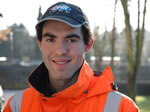
Bruno De Almeida Aveiro participates in training for unskilled young people co-funded by the European Social Fund and lands maintenance job for town's public gardens.
“I tried to study at school, but I just couldn't manage it,” says Bruno De Almeida Aveiro earnestly. Now 18, he remembers starting to have learning difficulties in class when he was only seven or eight. “I lost concentration very easily, and the teacher suggested I should go to a special school.”
Bruno lives with his family in the quiet village of Bissen in northern Luxembourg. His mother Benilde is a cleaner, his father Jorge works for a local firm specialising in metal construction materials. His older brother Hugo, 22, is an industrial engineer for a well-known tyre company.
Despite his problems with formal learning, Bruno mastered an impressive array of languages while he was growing up. His parents moved to Luxembourg from Portugal just before he was born, and they speak Portuguese at home. At primary school, the two brothers learnt Luxembourgish, picking up French and German as they got older. Now Hugo admits that between the two of them, they often communicate in an almost private language made up of words plucked from different tongues – nigh incomprehensible to outsiders. But as children, the language issue meant that neither of their parents were able to assist when they had questions in class.
Extra support
To help him overcome his problems, Bruno transferred to the Centre d'Integration Scolaire, where, with small classes and expert teachers he received extra help. Then, when he was in his early teens, he was offered the opportunity to spend one day a week at the Liewenshaff project in Merscheid, a scheme co-funded by the European Union through the European Social Fund. It helps young people with special problems or no formal qualifications to improve their social, academic and professional skills, and to integrate fully into society. Two years later, in 2006, Bruno started to attend the project full time.
He enjoyed the new approach at Liewenshaff. It offers five vocational training modules: cooking, agriculture, horticulture, iron working and industrial cleaning. Selecting cleaning, Bruno discovered a real interest in working with the machines and learning to use the right products. “I can concentrate on the things that interest me, and I learn quickly,” he explains, “and yet at other times I can't concentrate at all.” Indeed, when it comes to his favourite pastime, playing video games, he says he has no problem focusing on the on-screen adventures.
Starting a job
In 2008, the project helped Bruno to secure work experience with the local authority in Bissen itself. As part of the small municipal parks and gardens team, he is based at the depot just two minutes' walk from home. His state-funded salary is 80% of the minimum wage, and his three-month contract is twice-renewable. He and his colleagues are responsible for cleaning and caring for Bissen's public gardens and recreational spaces. The work varies with the seasons: collecting leaves in the autumn, helping to decorate the nativity scene in the town's main church at Christmas, and preparing beds and planting flowers in the spring. He has learnt more since starting the job and enjoys the variety. “I prefer to work than to study,” he admits.
His social worker at Liewenshaff continues to support him, and he goes back there frequently to lend a hand with events such as concerts and social activities. “Sometimes I help in the kitchen, sometimes with the cleaning,” he explains. “I know the people there.” After his nine months' work experience he can return to the centre if he still needs help to find permanent employment. Ideally, he would like to keep the job he has now, but he realises that may be difficult. The number of municipal staff is dictated by the size of the community, and he will have to wait for a vacancy to arise.
Preparation for life
Bruno's practical skills have also come in handy at home. Father and sons have spent ten years renovating their house from top to bottom. “It's still chaotic,” admits Bruno. “It's been hard, and we're still working on it.” He is also studying to obtain his driver's licence. That will open more doors, enabling him to drive the trucks and diggers, road gritters and sweepers that are lined up in Bissen's municipal garage.
But he doesn't reflect too much on the future. “I never thought about what I wanted to do in life, but at Liewenshaff I began to ask myself the question. I realised that I had to find a job, but I didn't know what.
“Since I was little, I have never thought about working. My family always helped me, and I expected everything to be easy. But life's not like that. At school, I wasn't advancing, and if it weren't for Liewenshaff I would not have been able to get a job at all,” he points out. “It showed me how life is, and that in life you have to work. I'm happy here. I'll have to see how things go.”
